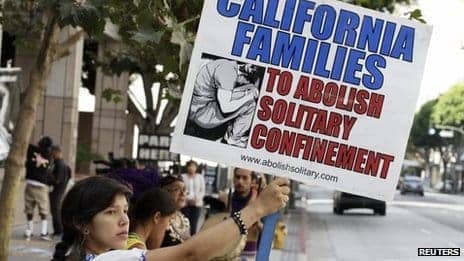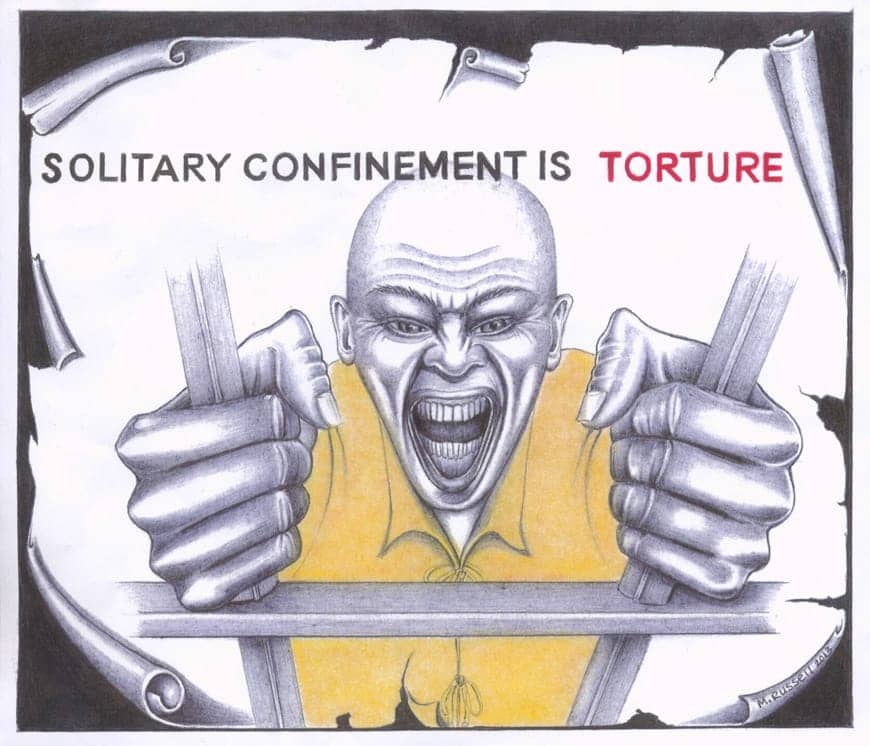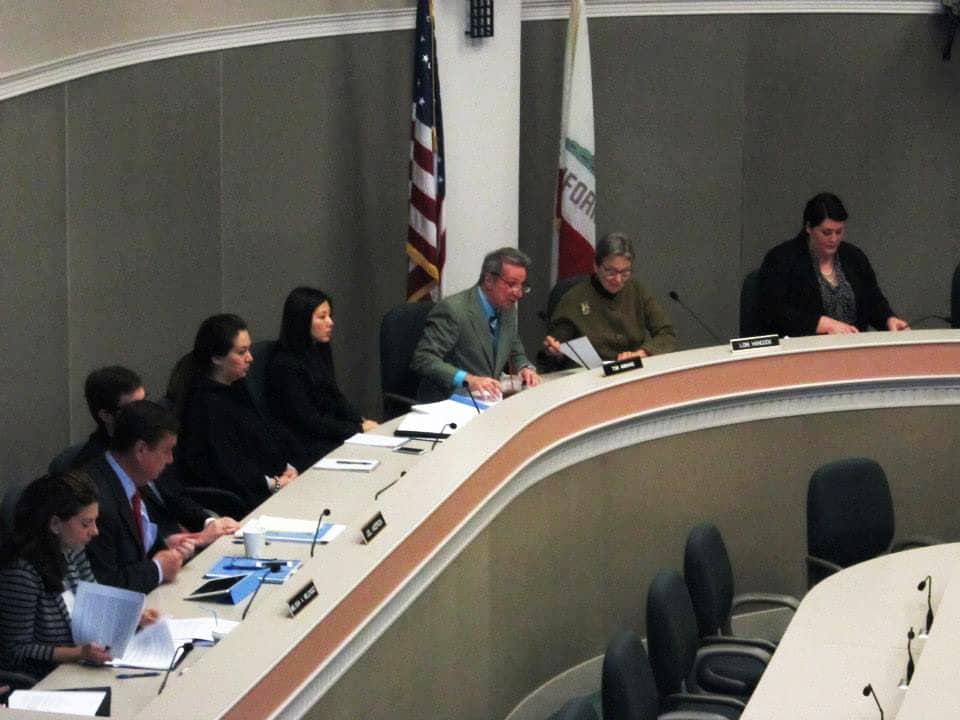Lawyers from the LA-based Center for Human Rights and Constitutional Law recently spent two days at Pelican Bay discussing with prisoners bills now introduced in the Senate by Sen. Loni Hancock and in the Assembly by Assemblyman Tom Ammiano dealing with solitary confinement. The Center’s lawyers met with Todd Ashker, Sitawa Nantambu Jamaa (R.N. Dewberry), Arturo Castellanos and Antonio Guillen, four of the prisoners in the Short Corridor who inspired the hunger strikes in 2011 and 2013 that were joined by 30,000 other prisoners at their peak.

The Assembly and Senate bills are very different in their approaches to solitary confinement. Ammiano’s bill, which the prisoners support, is short and simple and is focused on one critical issue: prohibiting the California Department of Corrections and Rehabilitation from placing prisoners in solitary confinement for mere alleged gang membership when there is no finding that they have engaged in serious misconduct.
The prisoners believe that this bill addresses a major concern with California’s current policy and does so in a clean-cut and effective way. In legal discussions and letters to the Center, prisoners suggested two additions to the Ammiano bill: First, that it incorporate a provision that would prohibit CDCR from using the testimony of an inmate informant to place someone in a SHU (Security Housing Unit, where prisoners are held in solitary confinement) unless the inmate’s testimony was corroborated by independent third party evidence.
Second, they recommend that data-gathering provisions in Loni Hancock’s Senate bill be added to Ammiano’s bill so data can be obtained from CDCR which could be used in the future to advocate for changes in regulations or additional legislation. However, prisoners support the Ammiano bill even if these two proposals are not adopted.
On the other hand, prisoners have informed the Center for Human Rights and Constitutional Law in personal interviews and letters that they do not support Loni Hancock’s Senate bill because for the first time in history it would put into state law authority for CDCR to place prisoners in solitary confinement for mere alleged gang membership without any accompanying serious misconduct. The prisoners believe this would be a major step backwards in the struggle to get California to follow other states that have terminated their “gang validation” policies as a basis for putting prisoners in solitary confinement.
Prisoners have informed the Center for Human Rights and Constitutional Law in personal interviews and letters that they do not support Loni Hancock’s Senate bill because for the first time in history it would put into state law authority for CDCR to place prisoners in solitary confinement for mere alleged gang membership without any accompanying serious misconduct.
They would support the Hancock Senate bill only if it adopted the Ammiano approach of prohibiting CDCR from placing prisoners in solitary confinement for mere alleged gang membership when there is no finding that they have engaged in serious misconduct. They would also want it to incorporate a provision that would prohibit CDCR from using the testimony of an inmate informant to place someone in a SHU unless the inmate’s testimony was corroborated by independent third party evidence.
Based on the prisoners’ positions, which seem fair and rational, several groups and community leaders, led by the California Families Against Solitary Confinement (CFASC) and the Center for Human Rights and Constitutional Law, submitted a letter to the Senate Appropriations Committee opposing the Hancock bill.

At a hearing before the Appropriations Committee held on April 28, Peter Schey, president of the Center for Human Rights, testified against the Hancock bill on behalf of a number of groups and individuals, including CFASC, Center for Prisoner Health and Human Rights, Centro Legal de la Raza, Community Futures, Council on American-Islamic Relations – California (CAIR), Families to Amend California’s Three Strikes (FACTS), Homeboy Industries, Homies Unidos, Interfaith Communities United for Justice and Peace, International Longshore and Warehouse Union Local 13 (ILWU), Justice Now, League of United Latin American Citizens (LULAC), Mexican American Political Association (MAPA), actor-activist Mike Farrell and labor leaders Maria Elena Durazo, executive secretary-treasurer of the Los Angeles County Federation of Labor (AFL-CIO), and Mike Garcia, president of the Service Employees International Union–United Service Workers West (SEIU-West). No one appeared to testify in favor of the bill.
Notably, neither CDCR nor CCPOA, the guards’ union, voiced any opposition to Hancock’s bill – whereas they had shown up in full force to oppose Ammiano’s bill.
The full text of the letter presented to the Senate Appropriations Committee appears below. Over the next few weeks, CFASC and the Center for Human Rights and Constitutional Law plan to intensify their lobbying and gather more support to block passage of the Hancock bill unless it is amended to prohibit CDCR from placing prisoners in solitary confinement for mere alleged gang membership when there is no finding that they have engaged in serious misconduct.
At the same time they will support passage of the Ammiano bill. “Whether we are fighting the gang validation policy in the courts or through public advocacy,” said Peter Schey of the Center for Human Rights, “we are far better off fighting a policy of the administration than something enshrined into state law by the legislature for the next 10 to 20 years.”
The breadth and strength of opposition that has quickly built up against Hancock’s bill shows that over the next few months a powerful statewide coalition will form to block the Hancock bill unless it’s amended to prohibit the CDCR’s gang validation policy.
Letter to Senate Appropriations Committee
The following letter, dated April 25, 2014, was addressed to
- Sen. Kevin de Leόn, Chair, Senate Appropriations Committee, State Capitol, Room 5108, Sacramento, CA 95814
- Sen. Loni Hancock, State Capitol, Room 2082, Sacramento, CA 95814
- Sen. Jerry Hill, State Capitol, Room 5064, Sacramento, CA 95814
- Sen. Ricardo Lara, State Capitol, Room 5050, Sacramento, CA 95814
- Sen. Alex Padilla, State Capitol, Room 4038, Sacramento, CA 95814
- Sen. Darrell Steinberg, State Capitol, Room 205, Sacramento, CA 95814
- Sen. William Monning, State Capitol, Room 4066, Sacramento, CA 95814
- Sen. Mark Leno, State Capitol, Room 5100, Sacramento, CA 95814
Re: SB 892 (solitary confinement)
Dear Sens. de Leόn, Hancock, Hill, Lara, Padilla, Steinberg, Monning and Leno:
This letter is submitted on behalf of the undersigned organizations and individuals.
The California Families Against Solitary Confinement (CFASC) and the Center for Human Rights and Constitutional Law (CHRCL), which represents approximately 450 California prisoners in solitary confinement, as well as several other organizations, have previously communicated to Sen. Hancock concerns with certain provisions in SB 892 with specific suggested amendments. To date we have not received any response indicating whether Sen. Hancock will seek to amend her bill to address these matters.
We are writing to explain our concerns with SB 892 that now comes before the Senate Appropriations Committee. We are respectfully requesting that consideration of SB 892 be delayed for a few weeks to allow greater input and discussion about the intended and unintended consequences enactment of the bill will cause.

While well-intentioned, SB 892 fails to reform the widely condemned, inhumane, and outdated “gang validation” policy of the California Department of Corrections and Rehabilitation (CDCR). Although the bill contains some positive provisions, it fails to include critical provisions needed to bring California law in line with modern prison security trends adopted in many other states – with successful results – and worse it institutionalizes “gang validation” as a basis for long-term solitary confinement for prisoners who have engaged in no serious wrong-doing while serving their sentences.
The cost of this program is estimated to be $44 million per year while 1) perpetuating the inhumane treatment of prisoners, 2) compromising the goal of rehabilitation and 3) causing hundreds of “validated” prisoners to suffer severe physical and mental disabilities – with added costs of treatment.
Prisoners and prison reform experts likewise agree that the minimal efforts in SB 892 to “improve” the due process rights of prisoners will be costly to the state while having little to no practical effect on prisoners’ rights.
We are most concerned with the provisions of SB 892 that will memorialize into state law the widely condemned and outdated policy of the CDCR of placing inmates in SHUs for mere alleged gang association without any actual incidents of misconduct. Gang validation practices have been criticized by prison reform advocates throughout the country, the United Nations Special Rapporteur on Torture, American Bar Association, Amnesty International, the U.S. government and members of Congress.
While the bill proposes an indefinite number of “step-down” programs for “validated” prisoners after several years to be released from solitary confinement, both prisoners and prison security experts believe the proposed step-down program will be ineffective as proposed in SB 892. CDCR already follows a similar step-down program, but only a relatively small number of “validated” gang members have been released from solitary confinement through the program.
Prisoners and prison reform experts likewise agree that the minimal efforts in SB 892 to “improve” the due process rights of prisoners will be costly to the state while having little to no practical effect on prisoners’ rights. Overall, SB 892 would leave California with the largest population of prisoners in solitary confinement of any country in the world or state in the United States at enormous cost to the taxpayers.
SB 892 would leave California with the largest population of prisoners in solitary confinement of any country in the world or state in the United States at enormous cost to the taxpayers.
From a budget standpoint, enactment of SB 892 in its present form will increase the incidence of costly litigation challenging the law, likely lead to further costly hunger strikes by prisoners in solitary confinement, cost the taxpayers $44 million a year for maintaining prisoners in solitary confinement based on mere alleged gang membership, and cause untold additional medical costs as hundreds of these prisoners suffer mental and physical disabilities due to their confinement in segregated housing units.
In contrast, Assembly Bill 1652, introduced by Assemblymember Ammiano, is far narrower in what it attempts to achieve, is far better drafted to achieve reforms in solitary confinement and gang validation practices in California, and would save about $50 million per year in prison costs.

We respectfully request that the Senate Appropriations Committee delay consideration of SB 892 for a few weeks to evaluate whether amendments can be made that will save costs and potentially close the gap between the SB 892 and AB 1652
We urge you to please contact Dolores Canales, California Families Against Solitary Confinement, (714) 290-9077, and Peter Schey, President, Center for Human Rights and Constitutional Law, 323-251-3223, to discuss whether consideration of SB 892 may be postponed for two to three weeks so that experts and family members may provide additional input for consideration by the Senate Appropriations Committee. Thank you for your consideration.
Respectfully,
California Families Against Solitary Confinement
Center for Human Rights and Constitutional Law
Center for Prisoner Health and Human Rights
Centro Legal de la Raza
Community Futures
Council on American-Islamic Relations – California (CAIR)
Families to Amend California’s Three Strikes (FACTS)
Hermandad Mexicana Humanitarian Foundation
Homeboy Industries
Homies Unidos
Interfaith Communities United for Justice and Peace
International Longshore and Warehouse Union, Local 13 (ILWU)
Justice Now
League of United Latin American Citizens
Mexican American Political Association (MAPA)
Peoples’ Action for Rights and Community
Students Against Mass Incarceration (UC)
William C. Velasquez Institute
Father Gregory Boyle, Executive Director, Homeboy Industries
Rabbi Joshua Brumbach, Ahavat Zion Synagogue, Beverly Hills
Dolores Canales (son incarcerated in Pelican Bay SHU)
Dennis R. Childs, Ph.D., Associate Professor, University of California, San Diego
Maria Elena Durazo, Executive Secretary-Treasurer, Los Angeles County Federation of Labor (AFL-CIO)
Mike Farrell (Actor-Activist)
Mike Garcia, President, Service Employees International Union- United Service Workers West (SEIU-West)
Irene Huerta (spouse incarcerated in Pelican Bay SHU)
James Lafferty, Executive Director, National Lawyers Guild – Los Angeles Chapter
Sharon Martinas (prison reform advocate)
Sister Elisa Martinez, MSW
Heidi L. Rummel, Co-Director, Post-Conviction Justice Project (PCJP)
Kimberly Starr (prison reform advocate)
Sarah Torres (prison reform advocate)
Kimberly Rohrbach (prison reform advocate)
Beth Witrogen (life partner incarcerated in Pelican Bay SHU)





